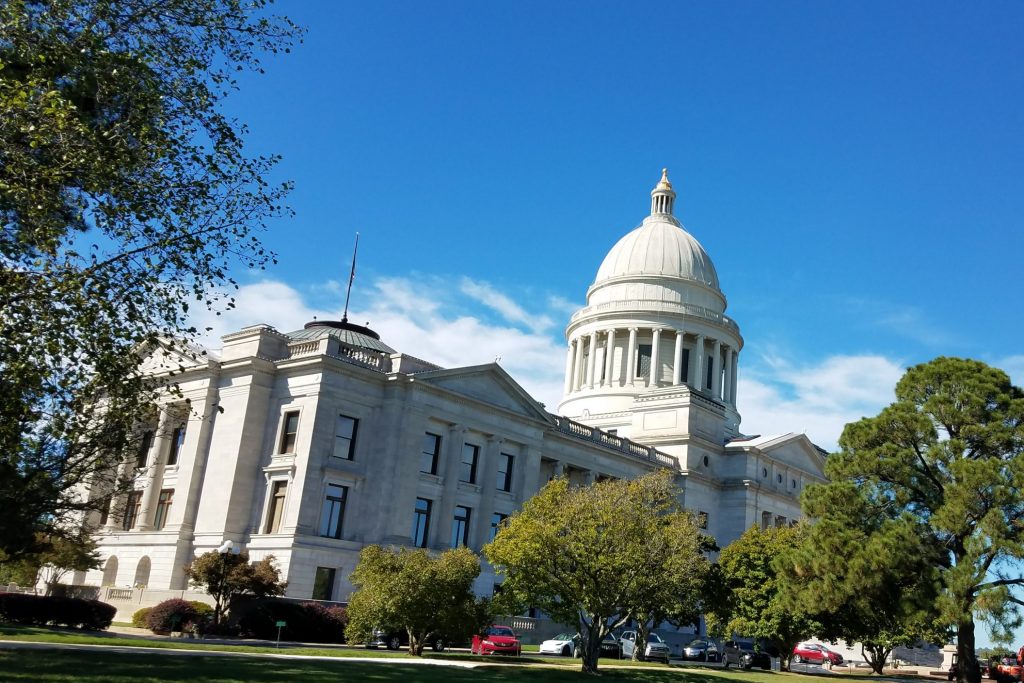Arkansas Lawmakers Earmark $2M for Moms in Need

On Tuesday the Arkansas Legislature passed a measure budgeting $2 million for grant funding to charities that help women with unplanned pregnancies.
H.B. 1202 by the legislature’s Joint Budget Committee allocates funds for various state programs, grants, and administrative needs in Arkansas’ upcoming 2025-2026 budget cycle.
H.B. 1202 includes $2 million in funding for grants to pregnancy help organizations.
Under H.B. 1202, grant money can go to pregnancy resource centers, maternity homes, adoption agencies, and other charitable organizations that provide material support to women with unplanned pregnancies.
The State of Arkansas also can award funding to charities that promote infant and maternal wellness and reduce infant and maternal mortality by:
- Providing nutritional information and/or nutritional counseling;
- Providing prenatal vitamins;
- Providing a list of prenatal medical care options;
- Providing social, emotional, and/or material support; or
- Providing referrals for WIC and community-based nutritional services, including food banks, food pantries, and food distribution centers.
The measure makes it clear that grant money will not go to abortionists or their affiliates.
Since 2022 Family Council has worked with the Arkansas Legislature and the governor to secure funding every year for pregnancy resource centers. These state-funded grants have helped support dozens of charities that assist women and children in Arkansas.
The grants are optional. Pregnancy resource centers are not required to accept public tax dollars if they do not want to. But for those who do receive grant money, the funding may make a tremendous difference.
Pro-lifers in Arkansas have worked hard to prohibit abortion. We need to work to make abortion irrelevant and unthinkable as well. Supporting pregnancy resource centers is one way we can do that.
Pregnancy resource centers give women real options besides abortion — making it less likely they will travel out of state for abortion or order illegal abortion drugs online.
Passage of H.B. 1202 means Arkansas will be able to continue providing real support to women and families. That is something to celebrate!
Articles appearing on this website are written with the aid of Family Council’s researchers and writers.
Arkansas Becomes Fifth State to Teach Public School Students About Development of Unborn Children
On Tuesday the Arkansas Legislature passed a good law to help teach public school students about unborn children.
Similar legislation reportedly has passed in North Dakota, Tennessee, Idaho, and Kansas.
S.B. 450 by Sen. Breanne Davis (R — Russellville) and Rep. Kendra Moore (R — Lincoln) lets public school students see a recording of a high-definition ultrasound video as part of human fetal growth and development education courses.
The law also makes it possible for students to learn important facts about how unborn children develop in the womb.
This year Arkansas lawmakers filed several good bills to teach students about unborn children.
H.B. 1180 by Rep. Mary Bentley (R — Perryville) and Sen. Clint Penzo (R — Springdale) would ensure public schools show students a high-definition ultrasound video that is at least three minutes long as part of sex-education and human growth and development education courses. The bill also makes it possible for students to see a video like Live Action’s computer-animated “Meet Baby Olivia” video that teaches about human development from conception to birth.
And H.B. 1946 by Rep. Bentley and Sen. Penzo requires public school human growth and development courses in grades 6 – 12 to include a three-minute high-definition ultrasound video and a high-quality, computer animated video depicting the process of fertilization and every stage of fetal development. Under H.B. 1946, this instruction would be included in biology instruction and in courses related to sex-education.
S.B. 450 received overwhelming support in the Arkansas Senate and House of Representatives. With its passage, Arkansas becomes the fifth state in America to provide fetal development and ultrasound education to public school students.
As we have said time and again, ultrasound images help demonstrate that unborn children are human beings.
Very few medical advancements have done more to change hearts and minds on abortion than ultrasound technology. In fact, research has shown that some women are less likely to have an abortion if they see an ultrasound image of their unborn child.
S.B. 450 will help teach students that unborn children are living human beings. Family Council is pleased to support this good law.
The Following Representatives Voted For S.B. 450
- Achor
- Andrews
- Barker
- Beaty Jr.
- Beck
- Bentley
- Breaux
- Brooks
- A. Brown
- K. Brown
- M. Brown
- N. Burkes
- R. Burkes
- Joey Carr
- John Carr
- Cavenaugh
- Childress
- C. Cooper
- Cozart
- Crawford
- Dalby
- Duffield
- Duke
- Eaton
- Eaves
- Eubanks
- Furman
- Gazaway
- Gonzales
- Gramlich
- Hall
- Hawk
- Henley
- Holcomb
- Hollowell
- Jean
- L. Johnson
- Ladyman
- Long
- Lundstrum
- Lynch
- Maddox
- Magie
- J. Mayberry
- McAlindon
- McClure
- McCollum
- M. McElroy
- McGrew
- B. McKenzie
- McNair
- S. Meeks
- Milligan
- J. Moore
- K. Moore
- Nazarenko
- Painter
- Pearce
- Pilkington
- Puryear
- Ray
- Richmond
- Rose
- Rye
- Schulz
- R. Scott Richardson
- M. Shepherd
- Steimel
- Torres
- Tosh
- Underwood
- Unger
- Vaught
- Walker
- Wardlaw
- Warren
- Wing
- Womack
- Wooldridge
- Wooten
- Speaker Evans
The Following Representatives Voted Against S.B. 450
- Barnett
- Clowney
- A. Collins
- Ennett
- D. Garner
- Hudson
- McCullough
- McGruder
- T. Shephard
- Springer
- Steele
- D. Whitaker
- Gonzales Worthen
The Following Representatives Did Not Vote
- F. Allen
- Barnes
- S. Berry
- K. Ferguson
- Perry
- J. Richardson
Articles appearing on this website are written with the aid of Family Council’s researchers and writers.



